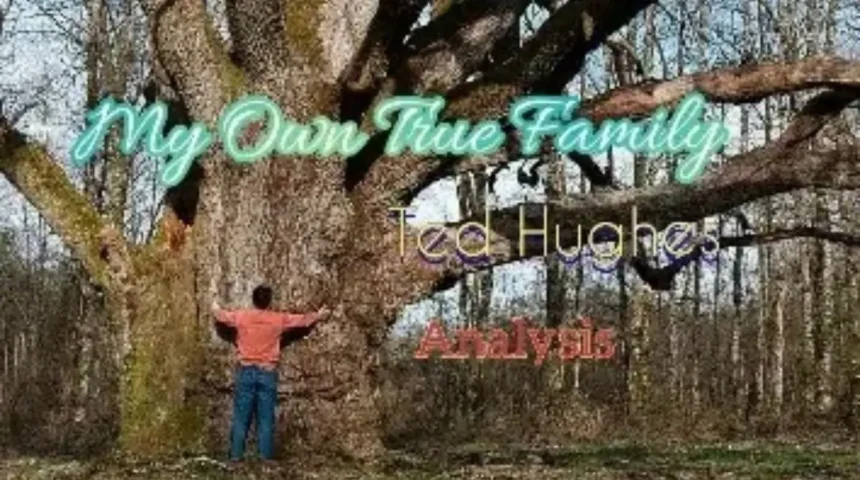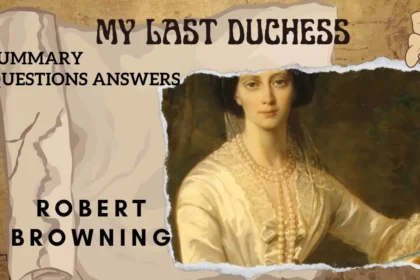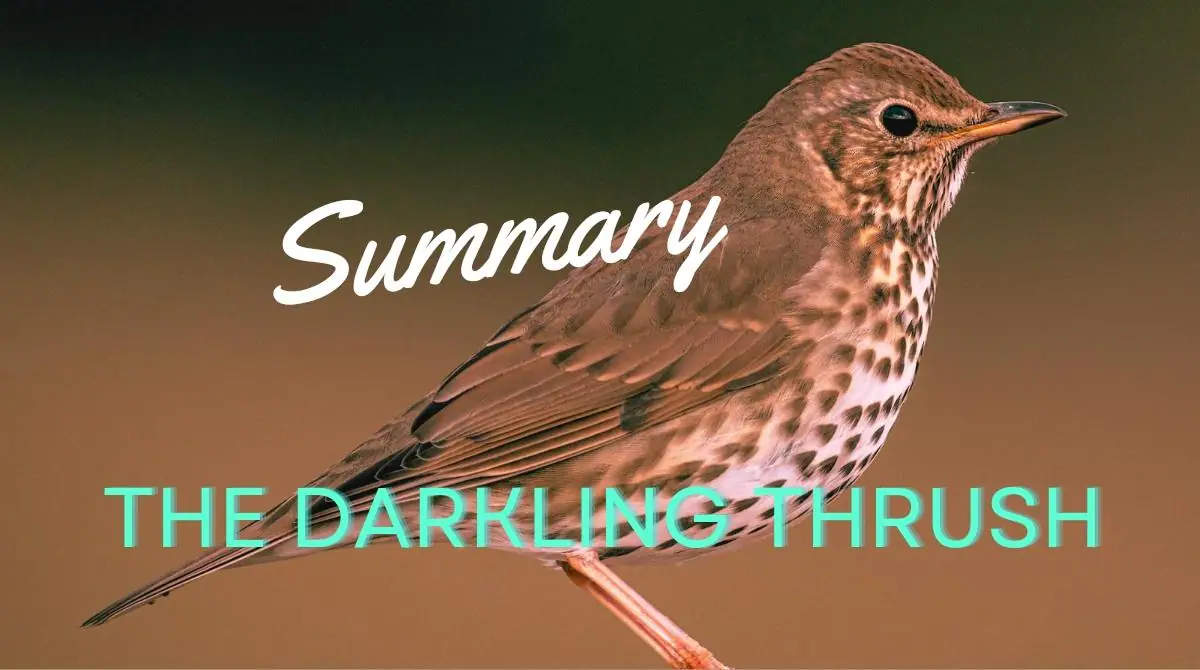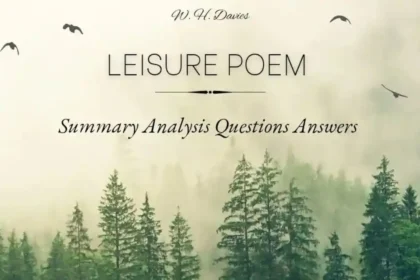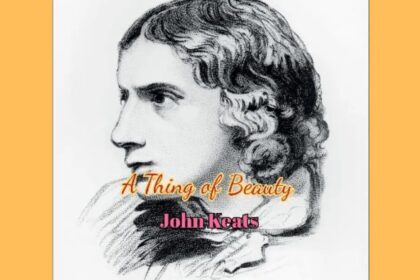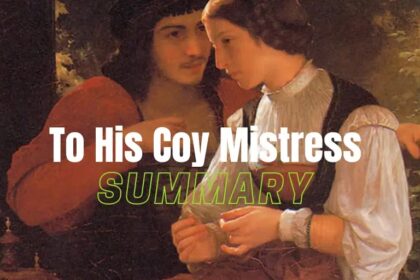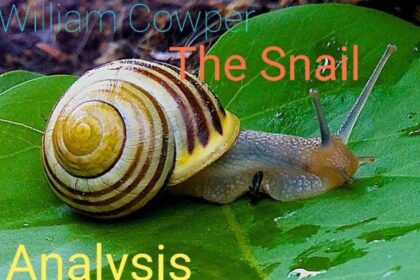My Own True Family Poem Questions Answers Summary
Here is detailed study of the poem My Own True Family written by Ted Hughes gives a strong message of the importance of trees and plants on the earth. In this lesson we will study every line with questions and answers of the poem My Own True Family and will try to understand the meaning and explanation of the poem My Own True Family by Ted Hughes. Click on the play button of the video below. So, let’s start..
■ Detailed analysis and bengali meaning of the poem My Own True Family by Ted Hughes
My Own True Family Poem Text:
My Own True Family
Ted Hughes
Once I crept in an oakwood – I was looking for a stag.
I met an old woman there – all knobbly stick and rag.
She said: ‘I have your secret here inside my little bag.’
Then she began to cackle and I began to quake.
She opened up her little bag and I came twice awake-
Surrounded by a staring tribe and me tied to a stake.
They said: ‘We are the oak-tress and your own true family.
We are chopped down, we are torn up, you do not blink an eye.
Unless you make a promise now – now you are going to die.’
Whenever you see an oak-tree felled, swear now you will plant two.
Unless you swear the black oak bark will wrinkle over you
And root you among the oaks where you were born but never grew.’
This was my dream beneath the boughs, the dream that altered me.
When I came out of the oakwood, back to human company,
My walk was the walk of a human child, but my heart was a tree.
My Own True Family Poem Summary:
The poem “My Own True Family” not only speaks of the importance of environment but also tells of Ted Hughes’ philosophical connection with nature. The poet who plays the role of a child enters in an oakwood in search of a stag.
There he meets an old woman who is unsteady in health with her torn clothes. The woman brings the poet under her magical spell and the poet in his trance gets transported to the world of nature where he discovers himself to be tied to a stake surrounded by the tribe of oak-tress. They claim to be his own true family members by the virtue of having important role for man’s existence on the earth.
The oak-trees rebuke the poet as he does not feel pain or moral disagreement to the system of unplanned deforestation. They make him promise that in future whenever he finds an oak-tree is felled, he will take the initiative to plant two oak-tress to replenish the loss. The poet is warned that if he fails to keep this promise then the black oak bark will wrinkle over him and he will be deeply rooted among the oaks.
Gradually he comes out from his trance and finds himself to be morally connected with the mother nature through the form of oak-tress. He ultimately acknowledges his affinity with the world of nature despite being a human child.
■ All Important Questions Answers from the poem My Own True Family
(1) Where did the poet creep in?
Ans:- The poet crept in an oakwood, looking for a stag.
(2) Whom did the poet meet and what was the appearance of the stranger?
Ans:- The poet met an old woman in an oakwood. The old woman was unsteady in health. She had a stick in her hand and she wore a dirty, torn cloth.
(3) What did the old woman say to the poet?
Ans:- The old woman told the poet that she had the secret of the poet inside her little bag.
(4) What was the first reaction of the old woman?
Ans:- The first reaction of the old woman was that she began to cackle that created a sense of tremor and terror in the poet.
(5) When did the poet come twice awake?
Ans:- The poet came twice awake when the old woman opened her little bag to disclose the secret of the poet.
(6) “I came twice awake” — Who came twice awake? Why did the poet come twice awake?
Ans:- The poet came twice awake when the old woman opened her little bag.
The poet came awake for the first time when his inner consciousness was awakened by discovering the cruelty done by human beings to nature. This awakening of inner self helped to awake his outer self to create a bondage with nature.
(7) Who are the true family of the poet and how?
Ans:- The oak trees are the true family of the poet. They are the own true family of the poet by virtue of being an important part of the eco-system.
(8) “You do not blink an eye” — What does the line suggest?
Ans:- The oak trees say that the poet does not blink an eye when they are cut down mercilessly. It suggests that the poet does not feel any pain and moral disagreement to the system of unplanned deforestation.
(9) What promise did the poet have to make?
Ans:- The poet had to make promise that he would plant two oak trees if he saw one oak tree being felled.
(10) What did the oak trees warn if the poet did not swear?
Ans:- The oak trees warned the poet telling him that unless he swore to plant more oak trees, the black oak bark would wrinkle over him and root him among the oaks.
(11) What does the phrase “you were born but never grew” mean?
Ans:- The word ‘grew’ signifies the mental development of the poet. The oak trees want to say that the poet inspite of being born in the midst of oak trees, his mental development of protecting the oak trees does not grow.
(12) What was the poet’s realisation coming out of the oakwood?
Ans:- Coming out of the oakwood, the poet realised the cruelty done by human beings to the trees by cutting them down. He also realised the adverse effects on environment caused by this brutality on the part of human beings.
(13) How did the dream alter the poet?
Ans:- After having the dream, the poet felt a change in his own self. He felt a strong bond of relationships between him and the oak trees. He also felt for the trees who had to undergo untold pain when they are felled.
(14) “My walk was the walk of a human child, but my heart was a tree” — What does the line suggest?
Ans:- By the expression, “my walk was the walk of a human child, but my heart was a tree” the poet wants to say that the dream has brought a change in his physical as well as his mental self. Though he remains physically a human being but his moral self is now attached with the oak trees and with their pain and suffering.
(15) Who was the poet surrounded by?
Ans:- The poet was surrounded by a staring tribe which suggests the oak tree family.
(16) Why did the poet quake?
Ans:- When the poet first met the old woman, she began to cackle that created a sense of tremor and terror in the poet. So he began to quake.
(17) What is the grievance of the oak trees?
Ans:- The oak trees had a grievance against the narrator because the he remained indifferent towards the suffering of the oak trees when they were chopped down and torn up.
(18) Who is the old woman in the poet?
Ans:- We can guess that the old woman in the poem represents as the mother of Nature.
(19) What does the old woman ‘all knobly stick and old rag’ stand for?
Ans: The phrase ‘all knobly stick and old rag’ describes poor condition of the old woman. But symbolically it suggests the degradation of our Nature which has been crippled by thoughtless torture by human beings.
(20) What is the message of the poem?
Ans: The poem conveys a serious message of the need to encourage afforestation and to stop merciless felling of trees to protect our natural environment.
(21) What did the poet see when the old woman open her little bag?
Ans: When the old woman opened her little bag, the poet saw that he was surrounded by a staring tribe and he was tied to a stake.
(22) What does the expression ‘twice awake’ suggest?
Ans: The expression ‘twice awake’ suggests the poet’s extreme wonder. Is is also used to suggest the reawakening of the poet’s inner soul.
You May Like To Read More:



